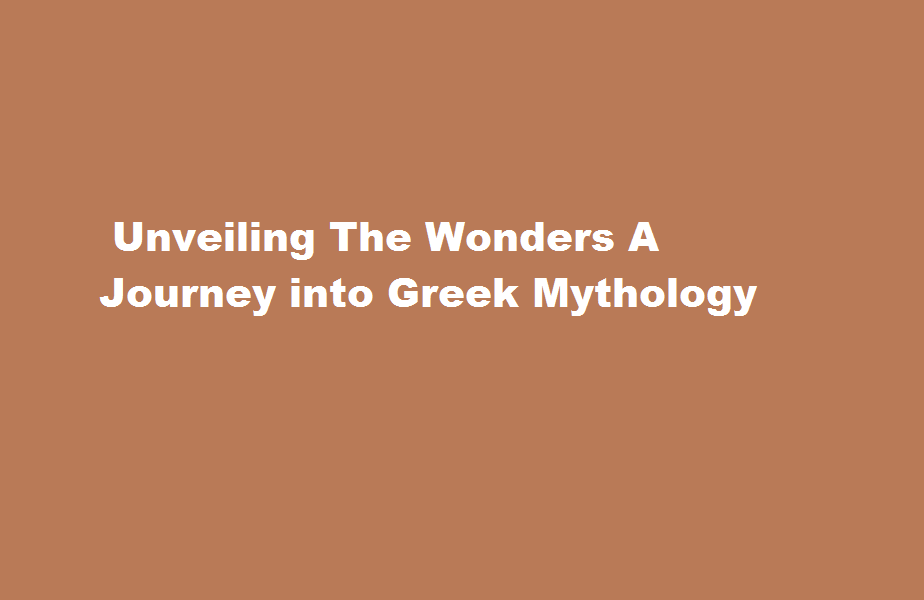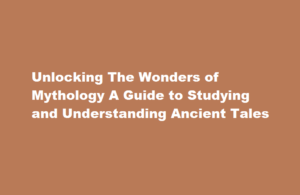Unveiling The Wonders A Journey into Greek Mythology
4 min read
Introduction
Greek mythology, an ancient and captivating tapestry of gods, heroes, and epic tales, has fascinated people for centuries. Exploring the rich narratives and symbolic meanings of this mythological realm not only deepens our understanding of ancient Greece but also provides timeless insights into the human condition. In this article, we will embark on a journey to learn about Greek mythology, delving into its origins, key deities, heroic tales, and the impact it continues to have on contemporary culture.
Origins and Significance
Greek mythology dates back to the ancient Greeks, who believed in a pantheon of gods and goddesses that governed different aspects of life. These myths were not only entertaining narratives but also served as explanations for natural phenomena, the origins of the world, and the human condition. Understanding the origins and significance of Greek mythology is crucial in appreciating its enduring impact.
Key Deities and Their Roles
At the core of Greek mythology are the Olympian gods and goddesses, a diverse and complex group with unique personalities, abilities, and domains. Zeus, the king of the gods, ruled over Mount Olympus, while his siblings, such as Poseidon and Hades, held dominion over the seas and the underworld, respectively. Athena embodied wisdom and strategic warfare, Aphrodite symbolised love and beauty, and Hermes was the messenger of the gods.
Heroic Tales and Epics
Greek mythology is replete with extraordinary heroes and their awe-inspiring feats. From Heracles’ twelve labours to the epic adventures of Odysseus in Homer’s “Odyssey,” these tales serve as windows into the virtues and flaws of mortals and gods alike. The heroes often faced mythical creatures like the Cyclops, Medusa, and the Minotaur, highlighting the constant struggle between good and evil, strength and cunning.
Symbolism and Themes
Greek mythology is rife with symbolism and themes that resonate across time. The gods and goddesses embody different aspects of human nature, serving as archetypes for human behaviour and emotions. Themes of hubris, fate, love, and loyalty permeate the myths, offering profound insights into the complexities of human existence and moral dilemmas. By exploring these themes, we gain a deeper understanding of ourselves and our place in the world.
Influence on Art, Literature, and Popular Culture
Greek mythology has left an indelible mark on art, literature, and popular culture. From classical sculptures depicting mythological scenes to renowned works of literature like “The Iliad” and “The Aeneid,” the influence of Greek myths is evident. Moreover, countless contemporary books, movies, and video games draw inspiration from these ancient tales, showcasing the timeless appeal of these narratives.
Learning Greek Mythology
To embark on a journey into Greek mythology, one can start by reading reliable and accessible sources such as Edith Hamilton’s “Mythology” or Robert Graves’ “The Greek Myths.” Exploring original texts, including Homer’s epics and Hesiod’s “Theogony,” offers a deeper dive into the source material. Online resources, podcasts, and courses dedicated to Greek mythology provide additional avenues for learning. Engaging with visual representations, such as museum exhibits or artistic interpretations, can enhance the understanding and appreciation of these ancient stories.
Frequently Asked Questions
What is the best way to learn Greek mythology?
One of the best resources is GreekMythology.com, which is an app, YouTube channel, and website. The website has the most information with a clear outline of each god and goddess as well as the famous myths. Besides GreekMythology.com, there are many videos on YouTube that explain different aspects of Greek mythology.
What are the 4 key concepts of Greek myths?
According to Hesiod, four primary divine beings first came into existence: the Gap (Chaos), Earth (Gaea), the Abyss (Tartarus), and Love (Eros).
Conclusion
Greek mythology continues to captivate and inspire generations, offering profound insights into human nature and the world around us. By delving into the origins, deities, heroic tales, and themes of Greek mythology, we unlock a treasure trove of wisdom and timeless narratives that still resonate in our modern lives. Embark on this journey, and let the wonders of Greek mythology unfold before you.
Read Also : Unlocking The Wonders of Mythology A Guide to Studying and Understanding Ancient Tales






